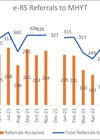Features
Robotic Reconstructive Urology Clinical Observership at NYU Langone Health, New York: supported by The Urology Foundation Career Development Support Fund
Reconstructive urology is an important area of clinical need within our population. However, within the context of competing service priorities, it continues to face resource and training challenges. Across the UK, only a small number of centres currently offer a...
Innovations in flexible ureteroscopy for renal calculi: a comprehensive review
This article has been verified for CPD. Click the button below to answer a few short questions and download a form to be included in your CPD folder. Flexible ureteroscopy (f-URS) has become a core modality in the treatment of...
Urology around the world: Pioneering paths – my journey as the first and only Italian female urologist in the Muslim world
Maria Colavita. As the first and only Italian female urologist practising in the Muslim world, my journey has been shaped by ambition, grief, cultural curiosity, and ultimately, profound transformation. What began with an unexpected invitation has become a story of...
Urology around the world: An overview of healthcare in Germany
Germany boasts a highly developed and comprehensive healthcare system, renowned for its quality and accessibility. The urology landscape in the country mirrors this overall excellence, characterised by a well-structured network of specialists, advanced technology, and a strong emphasis on patient-centered...
From overseas to the UK: initial impressions
A few years ago we published stories from three international medical graduates detailing their experience of working as registrars in the UK (https://www.urologynews.uk.com/education/trainees-forum/post/initial-impressions-of-urology-in-the-uk-from-overseas-trainees). Here are three new countries and three new opinions. Dinelle Sirjuesingh, Trinidad and Tobago Trinidad and Tobago...
Systematic reviews and meta-analysis – a stepwise approach
As per Cochrane definition (2013), a systematic literature review (SR) attempts “to identify, appraise and synthesize all the empirical evidence that meets pre-specified eligibility criteria to answer a given research question” [1]. A meta-analysis (MA) is a statistical assessment of...
Delivering a trainee-led Urolink educational programme – my experience in Tanzania
In May 2023, I travelled to Moshi, Tanzania, where I visited Kilimanjaro Christian Medical Centre (KCMC) – a trip which was made possible through the collaborative efforts of the British Association of Urological Surgeons (BAUS) Urolink and with the support...
Urology National Selection: tips and tricks for a successful interview process
We invited Dominic Brown, the top-ranking candidate from the Urology National Training Selection Interview 2023, to share his wisdom on the interview process. Dominic is currently an ST3 working in North West London. Kelly Ong, Urology News Trainees Sub-Editor. 1....
Urology around the world: India: past, present, and future
Past India has the largest population in the world, standing at 1.43 billion as of September 2023. This vast population across a huge geographical area brings unique healthcare challenges, including the full range of urologic conditions. Urology is a relatively...
An update on robotic surgery in urology
The early adoption of new technology has long been a trademark of urological surgeons. Like the introduction of the cystoscope, lasers and flexible endoscopy, the field of urology has witnessed a revolutionary transformation with the advent of robotic surgery. Robotic-assisted...
Sperm selection techniques in assisted reproductive technologies: state of the ART?
Infertility is the inability to achieve pregnancy following one year of regular, unprotected intercourse (in the fertile phase of the menstrual cycle). Infertility is a common problem that affects between 7 and 15% of couples worldwide, with male factor infertility...
Intelligent triage: improving outpatient efficiency
Background Improving outpatient (OP) efficiency and service structure is of paramount importance as the NHS seeks to manage ever increasing demand in the wake of the COVID-19 pandemic. As we re-establish services and attempt to clear the backlog, new ways...















